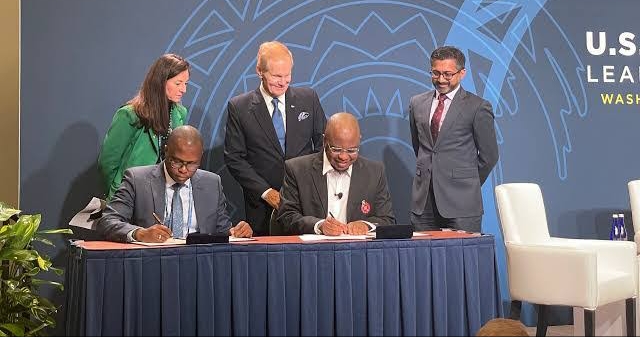By Enyichukwu Enemanna
Nigeria and Rwanda have signed the Artemis Accords that will enable both countries to develop strategic partnerships and new opportunities in the space industry and scientific research.
According to a statement released by the US Department of State, the signing took place on Tuesday at the maiden US-Africa Space Forum, where participants discussed how to further shared goals through the peaceful exploration and use of outer space.
This formed part of the ongoing US-Africa Leaders Summit, which started on Tuesday in the US capital, Washington DC.
“The accords were signed by the Minister of Communications and Digital Economy Prof. Isa Pantami, on behalf of the Federal Republic of Nigeria and by Rwanda Space Agency CEO, Francis Ngabo, on behalf of the Republic of Rwanda,” the statement read in part.
The Artemis Accords establish a framework to guide responsible, transparent behaviour in space with principles to guide the next phase in space exploration, reinforcing and providing for important operational implementation of key obligations in the 1967 Outer Space Treaty.
The accords also reinforce the commitment by the United States and signatory nations to the Registration Convention, the Rescue and Return Agreement, as well as guidelines and best practices.
Nigeria and Rwanda become the first two African countries and the 22nd and 23rd Nations to sign the Artemis Accords, respectively.
NASA is leading the Artemis missions and international partnerships could play a key role in achieving a sustainable and robust presence on the Moon and venturing into a historic human mission to Mars.
NASA Administrator, Bill Nelson said that space isn’t a national effort but it’s a global one.
“The Artemis Accord is all about what we should do peacefully in space, signaling the intention to help each other out, standardization of instruments so we can come to each other’s aid when there is a problem,” Nelson said.
“As the first African nations to sign the Artemis Accords, Nigeria and Rwanda exemplify the global reach of the accords and are demonstrating their leadership in space exploration.”
Signatories commit to principles to guide their civil space activities, including the public release of scientific data, responsible debris mitigation, registration of space objects, and the establishment and implementation of interoperability standards.




































